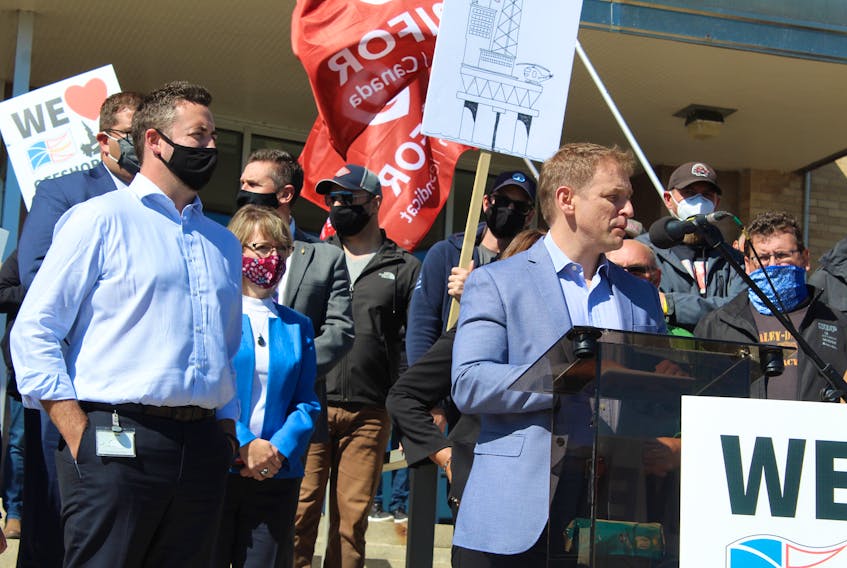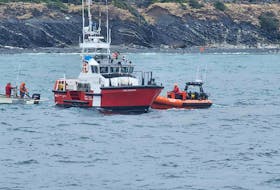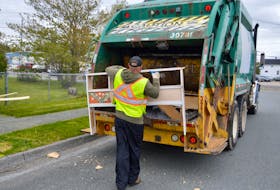ST. JOHN'S, N.L. — As Premier Andrew Furey settles in at Newfoundland and Labrador’s helm, one group is using the change in provincial leadership to push for more action on climate change.
“We're keeping an eye on the kind of moves he's making, especially early in office,” said Heather Elliott, a member of the Coalition for a Green New Deal NL, a group formed August of last year, and which is also affiliated with the Social Justice Cooperative NL.
Elliott spearheaded writing a letter from the group to the premier. The letter was also shared with The Telegram.

In it, the coalition calls climate change the most significant factor affecting the health and well-being of people in the province. It says the need to move away from fossil fuels is “immediate.”
The letter says a government focus on trying to return the province to oil’s more lucrative days is “akin to driving down Pitts Memorial Highway using only your rearview
mirror to get you to where you’re going – you’re going to lose track of where you are, and likely end up in a ditch.”
Elliott said the group wrote the letter in hopes of becoming an ally to the provincial government to help with drafting policy.
Trimper shares mandate
It’s a timely proposition considering Furey appointed Lake Melville MHA Perry Trimper as his special advisor on climate change, a role which Trimper described to The Telegram as “being more on the policy side on trying to bring in input from folks in organizations outside of government.”

Trimper said his mandate is to advise the premier on matters related to environmental protection, including considering the effects of government policy on climate, and ways to mitigate and manage climate risks.
His mandate also says he will provide guidance toward achieving the province’s climate targets, including the commitment to net zero emissions by 2050, and exploring opportunities for sustainable economic growth in the province.
And it seems Trimper shares some of the Coalition’s views when it comes to climate change.
“I think climate change is definitely the number one threat facing not just this province, but the world,” he said.
“So, we've got to get off carbon-based fuel sources. That said, it isn't going to happen overnight.
“Just a few years ago, we had set a target of trying to get to 10 per cent below 1990 levels by 2020. Well, we're in 2020 now, and we're still not there. So we really need to quantitatively challenge ourselves, and then monitor progress against. It’s the only way we're going to do it.” — Perry Trimper
“We're very fortunate that we have an abundance of relatively low-emitting oil off our shore that can help economies in this transition. It's going to take some time to get to a point where people are using non-GHG emitting vehicles, sources of energy, and so on. And in the meantime, I feel that we are well-poised to help with the supply of oil until we get off those internal combustion engines.”
Province working on green jobs
The Telegram requested an interview with Furey, but he was unavailable.
The Telegram asked the premier’s office whether Furey will work to move the province away from oil and gas to non-fossil fuel energy sources and employment. His office responded with an emailed statement.
“Creating a strong and vibrant offshore oil and gas industry to ensure some of the lowest emission production can continue to be part of the global energy mix is a way that we can help achieve our commitment to net zero emissions by 2050,” reads the email.
“We know that the demand for oil is forecast to increase through to 2040 — it will take quite some time for the global transition from fossil fuels. However, the global outlook for energy is changing and a greening of fossil fuels is anticipated.
“Our offshore projects are already among some of the lowest carbon-intensity-emitting facilities in the world; our oil is a light, sweet crude with low emissions. Global energy companies focused on environmental sustainability are increasingly interested in our low greenhouse gas production.
“Government, businesses and residents throughout our province have been clear that action is needed to preserve and accelerate the economy of Newfoundland and Labrador through investment in the offshore oil and gas industry.
“Work is ongoing on this very important issue, as we continue to press the federal government for specific supports that are responsive to Newfoundland and Labrador’s oil and gas industry.”
The statement goes on to say the province is working with the federal government to create jobs in a green economy, and reduce the impacts of climate change and carbon emissions, citing five new programs the province announced this year for energy efficiency and fuel switching.
The statement also says that by next year, 98 per cent of the province’s electricity will come from renewable energy.
Future without oil and gas
Meanwhile, Elliott said she would like to see the premier acknowledge oil and gas might not have a huge future in the province.
“And that (it) is OK, and that people will still have jobs, that there is still a way for Newfoundland to move forward that doesn't involve relying on fossil fuels.”
Elliott said it’s about creating a diversified economy with a focus on training for green-energy jobs, promotion of hybrid and electric vehicles and making the province more of a hub for innovation, all while transitioning away from oil and gas.
“Oil and gas is not the be-all, end-all of this province,” she said.
“Cod was not the be-all, end-all of this province. It can be very disconcerting when you're moving from one industry to another, especially when it's an industry that massively employs a huge chunk of your population. But I think in the long run, it's so important for us to look at the planet that we're leaving our kids, our friends’ kids, our grandkids. What are we leaving them when we go?”
Trimper said the key to reaching net zero is having measurable objectives.
“Just a few years ago, we had set a target of trying to get to 10 per cent below 1990 levels by 2020. Well, we're in 2020 now, and we're still not there. So we really need to quantitatively challenge ourselves, and then monitor progress against. It’s the only way we're going to do it.”
He called a move away from fossil fuels to greener energy “an end goal,” noting people struggle with “rapid change.”
Trimper said having a plan with milestones is something to which people can adjust.
“It's when it happens overnight … it’s when people are suddenly thrown out, and are on the steps of Confederation Building asking political leaders to listen to them, and the sudden stark reality of being out of a job after spending a career in this industry (that) is really shocking.
“We know where we need to go. We need to develop a transition, whether it's using our oil and gas, whether it's connecting our communities through the hydroelectricity that we do have an abundance of, through just some other strategies. It's going to need a lot of work...our economy needs to survive this as well.”









